人教版九年级英语unit6知识要点总结
- 格式:doc
- 大小:57.50 KB
- 文档页数:8
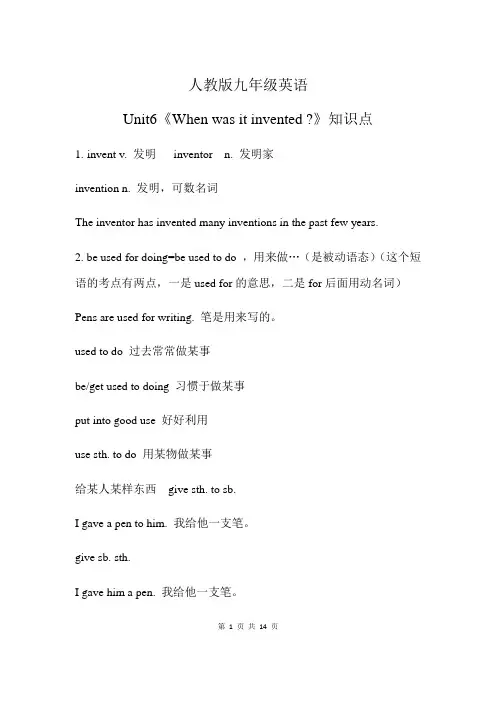
人教版九年级英语Unit6《When was it invented ?》知识点1.invent v. 发明inventor n. 发明家invention n. 发明,可数名词The inventor has invented many inventions in the past few years.2. be used for doing=be used to do ,用来做…(是被动语态)(这个短语的考点有两点,一是used for的意思,二是for后面用动名词)Pens are used for writing. 笔是用来写的。
used to do 过去常常做某事be/get used to doing 习惯于做某事put into good use 好好利用use sth. to do 用某物做某事给某人某样东西give sth. to sb.I gave a pen to him. 我给他一支笔。
give sb. sth.I gave him a pen. 我给他一支笔。
第 1 页共14 页pass/offer /send/show/write/bring/sell/lend/serve/ tobuy/cook/make/get/sing/prepare for4. all day 整天all evening/night the whole day5. salty adj. 咸的salt n. 盐sour/sweet/bitter/hot/salty酸甜苦辣咸6. by mistake 错误地(犯错是:make mistakes=make a mistake,这些常见的短语大家务必要掌握)I took the umbrella by mistake. 我不小心拿错了雨伞。
7. by accident/chance 意外,偶然(常见短语,考的最多的是它的意思)I met her by accident at bus stop.我在公共汽车站意外地见到了她。
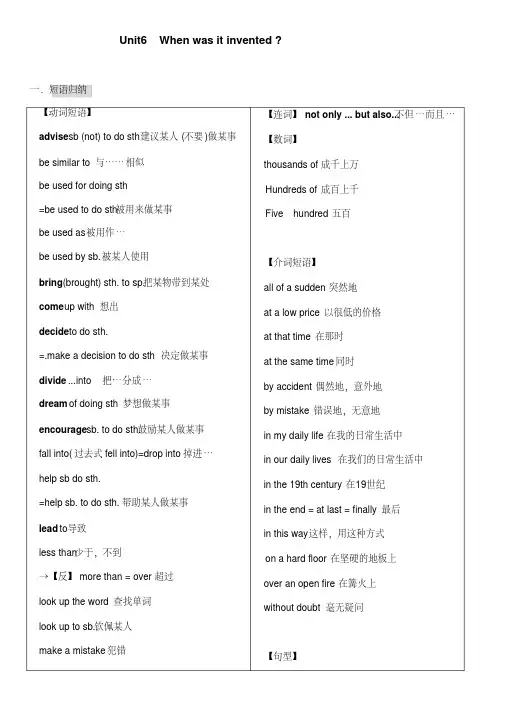
Unit6 When was it invented ? 一.短语归纳【动词短语】advise s b (not) to do sth建议某人(不要)做某事be similar to 与……相似be used for doing sth=be used to do sth被用来做某事be used as 被用作…be used by sb. 被某人使用bring(brought) sth. to sp.把某物带到某处come u p with 想出decide t o do sth.=.make a decision to do sth 决定做某事divide ...into…把…分成… dream of doing sth 梦想做某事encourage s b. to do sth.鼓励某人做某事fall into(过去式fell into)=drop into掉进…help sb do sth.=help sb. to do sth. 帮助某人做某事lead to导致less than少于,不到→【反】more than = over 超过look up the word 查找单词look up to sb.钦佩某人make a mistake 犯错【连词】not only ... but also...不但…而且…【数词】thousands of 成千上万Hundreds of 成百上千Five hundred 五百【介词短语】all of a sudden 突然地at a low price 以很低的价格at that time 在那时at the same time 同时by accident 偶然地,意外地by mistake 错误地,无意地in my daily life在我的日常生活中in our daily lives 在我们的日常生活中in the 19th century 在19世纪in the end = at last = finally 最后in this way这样,用这种方式on a hard floor 在坚硬的地板上over an open fire 在篝火上without doubt 毫无疑问【句型】make sb. + adj. 使某人怎么样make sb do sth使某人做某事be made to do sth 被使唤去做某seem+to+动词原形好像做某事start doing sth 开始做某事stop s b from doing sth 阻止某人做某事teach(taught) sb to do sth 教某人做某事think of = think about 想到,考虑translate...into....把…翻译成… work hard 努力工作work on sth 致力于某事work together 一起工作It is believed that人们相信It is said that 据说it mentioned that 它提到回答别人的感谢时的句型It's my pleasure.= My pleasure. 我的荣幸=Don't mention it.不客气,不用谢。
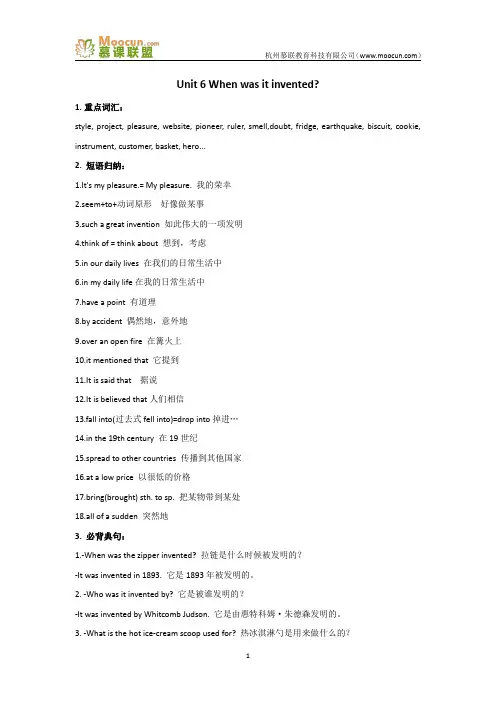
Unit 6 When was it invented?1.重点词汇:style, project, pleasure, website, pioneer, ruler, smell,doubt, fridge, earthquake, biscuit, cookie, instrument, customer, basket, hero...2. 短语归纳:1.It's my pleasure.= My pleasure. 我的荣幸2.seem+to+动词原形好像做某事3.such a great invention 如此伟大的一项发明4.think of = think about 想到,考虑5.in our daily lives 在我们的日常生活中6.in my daily life在我的日常生活中7.have a point 有道理8.by accident 偶然地,意外地9.over an open fire 在篝火上10.it mentioned that 它提到11.It is said that 据说12.It is believed that人们相信13.fall into(过去式fell into)=drop into掉进…14.in the 19th century 在19世纪15.spread to other countries 传播到其他国家16.at a low price 以很低的价格17.bring(brought) sth. to sp. 把某物带到某处18.all of a sudden 突然地3. 必背典句:1.-When was the zipper invented? 拉链是什么时候被发明的?-It was invented in 1893. 它是1893年被发明的。
2. -Who was it invented by? 它是被谁发明的?-It was invented by Whitcomb Judson. 它是由惠特科姆·朱德森发明的。
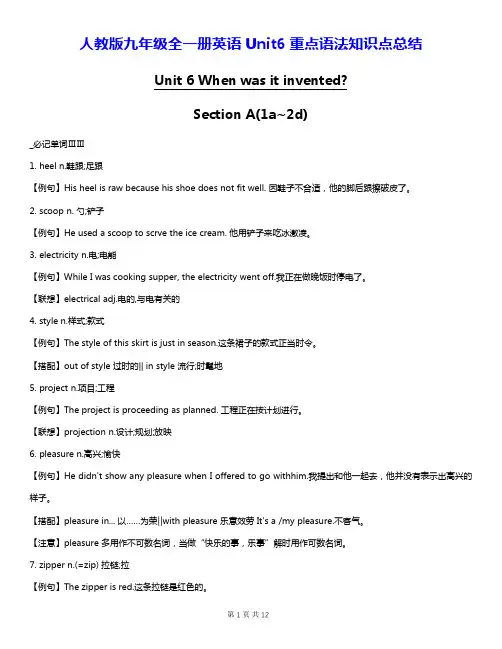
人教版九年级全一册英语Unit6重点语法知识点总结Unit 6 When was it invented?Section A(1a~2d)_必记单词ⅢⅢ1. heel n.鞋跟;足跟【例句】His heel is raw because his shoe does not fit well. 因鞋子不合适,他的脚后跟擦破皮了。
2. scoop n. 勺;铲子【例句】He used a scoop to scrve the ice cream. 他用铲子来吃冰激凌。
3. electricity n.电;电能【例句】While I was cooking supper, the electricity went off.我正在做晚饭时停电了。
【联想】electrical adj.电的,与电有关的4. style n.样式;款式【例句】The style of this skirt is just in season.这条裙子的款式正当时令。
【搭配】out of style 过时的|| in style 流行;时髦地5. project n.项目;工程【例句】The project is proceeding as planned. 工程正在按计划进行。
【联想】projection n.设计;规划;放映6. pleasure n.高兴;愉快【例句】He didn't show any pleasure when I offered to go withhim.我提出和他一起去,他并没有表示出高兴的样子。
【搭配】pleasure in... 以……为荣‖with pleasure 乐意效劳It's a /my pleasure.不客气。
【注意】pleasure 多用作不可数名词,当做“快乐的事,乐事”解时用作可数名词。
7. zipper n.(=zip) 拉链;拉【例句】The zipper is red.这条拉链是红色的。
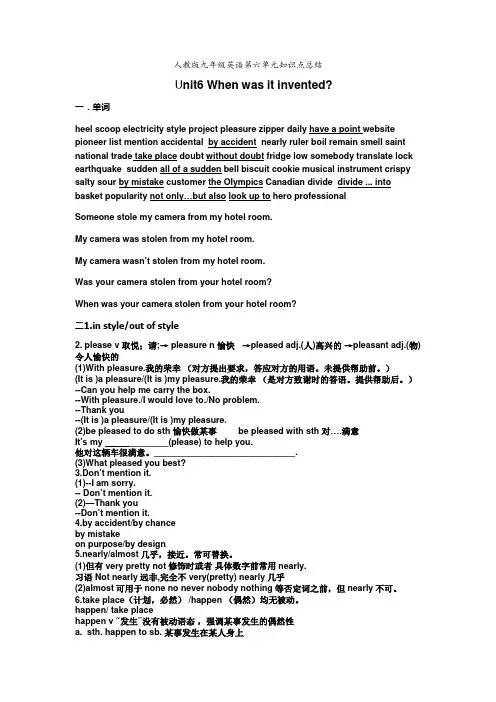
人教版九年级英语第六单元知识点总结2. please v 取悦;请;→ pleasure n 愉快→pleased adj.(人)高兴的→pleasant adj.(物)令人愉快的(1)With pleasure.我的荣幸(对方提出要求,答应对方的用语。
未提供帮助前。
)(It is )a pleasure/(It is )my pleasure.我的荣幸(是对方致谢时的答语。
提供帮助后。
)--Can you help me carry the box.--With pleasure./I would love to./No problem.--Thank you--(It is )a pleasure/(It is )my pleasure.(2)be pleased to do sth 愉快做某事 be pleased with sth 对….满意It’s my _____________(please) to help you.他对这辆车很满意。
_____________________________.(3)What pleased you best?3.Don’t mention it.(1)--I am sorry.-- Don’t mention it.(2)—Thank you--Don’t mention it.4.by accident/by chanceby mistakeon purpose/by design5.nearly/almost几乎,接近。
常可替换。
(1)但有very pretty not修饰时或者具体数字前常用nearly.习语 Not nearly远非,完全不 very(pretty) nearly几乎(2)almost可用于none no never nobody nothing等否定词之前,但nearly不可。
6.take place(计划,必然) /happen (偶然)均无被动。
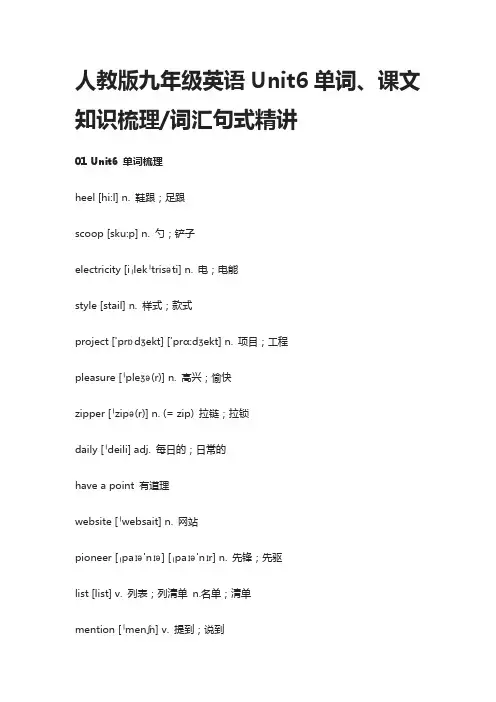
人教版九年级英语Unit6单词、课文知识梳理/词汇句式精讲01 Unit6 单词梳理heel [hi:l] n. 鞋跟;足跟scoop [sku:p] n. 勺;铲子electricity [iˌlekˈtrisəti] n. 电;电能style [stail] n. 样式;款式project ['prɒdʒekt] ['prɑ:dʒekt] n. 项目;工程pleasure [ˈpleʒə(r)] n. 高兴;愉快zipper [ˈzipə(r)] n. (= zip) 拉链;拉锁daily [ˈdeili] adj. 每日的;日常的have a point 有道理website [ˈwebsait] n. 网站pioneer [ˌpaɪə'nɪə] [ˌpaɪə'nɪr] n. 先锋;先驱list [list] v. 列表;列清单n.名单;清单mention [ˈmenʃn] v. 提到;说到accidental [ˌæksɪˈdentl] adj. 偶然的;意外的.by accident 偶然;意外地ruler [ˈru:lər] n. 统治者;支配者boil [bɔil] v. 煮沸;烧开remain [rɪˈmeɪn] v. 保持不变;剩余smell [smel] v.(smelt[]smelt,smelled[] smelled)发出……气味;闻到saint[seint] n. 圣人;圣徒national ['næʃnəl] adj. 民族的;国家的;trade[treɪd] n.贸易;交易;v.做买卖;从事贸易;take place 发生;出现popularity [pɒpjʊ'lærətɪ] n.受欢迎,普及,doubt [daut] n. 疑惑;疑问v. 怀疑without doubt 毫无疑问;的确 .fridge [fridʒ] n. 冰箱 .low [loʊ] adj. 低的;矮的somebody ['sʌmbədi] pron.某人n.重要人物translate [trænsˈleit] v. 翻译 .lock [lɔk][la:k] v. 锁上;锁住n.锁ring [rɪŋ] v.(rang,rung)发出钟声或铃声;打电话earthquake [ˈʒ:(r)θkweik] n. 地震 .udden [ˈsʌdən] adj. 突然(的).all of a sudden 突然;猛地.bell [bel] n.钟(声);铃(声)biscuit [ˈbiskit] n. 饼干 .cookie[ˈkuki] n. 曲奇饼干 .musical [ˈmju:zɪkl] adj. 音乐的;有音乐天赋的instrument [ˈinstrumənt] n. 器械;仪器;工具. crispy [ˈkrispi] adj. 脆的;酥脆的.salty [ˈsɔ:lti] adj. 咸的sour [ˈsauə(r)] adj. 酸的;有酸味的 .mistake 错误地;无意中customer [ˈkʌstəmə(r)] n. 顾客;客户 .the Olympics [əˈlimpiks] 奥林匹克运动会.Canadian [kəˈneidiən] adj. 加拿大的;加拿大人的n.加拿大人 .divide [diˈvaid] v. 分开;分散 .divide ...into 把……分开 .basket [ba:ski[] n. 篮;筐 .not only ...but also ...不但……而且……look up to 钦佩;仰慕hero [ˈhiərəu] n. 英雄;男主角Professional [prəˈfeʃənl] adj.职业的;专业的Berlin [bə:lin] 柏林(德国城市) .NBA (National Basketball Association) 国家篮球协会(美国职业篮球联赛) .CBA (China Basketball Association) 中国篮球协会(中国职业篮球联赛) . Roy n. 罗伊(男子名)Whitcomb [ˈwitkəm] Judson [ˈdʒʌdsən]惠特科姆•贾德森 .Ruby [ˈru:bi] 鲁比(人名)Thomas [ˈtɔməs] Watson [ˈwɔtsən] 托马斯•沃森George [dʒɔ:(r)dʒ] Crum [krʌm] 乔治•克拉姆James[dʒeimz] Naismith[ˈnaismiθ]詹姆斯•奈史密斯02 Unit6 知识梳理【重点短语】1.It's my pleasure.= My pleasure. 我的荣幸2.seem+to+动词原形好像做某事3.such a great invention 如此伟大的一项发明4.think of = think about 想到,考虑5.in our daily lives 在我们的日常生活中6.in my daily life在我的日常生活中7.have a point 有道理8.by accident 偶然地,意外地9.over an open fire 在篝火上10.It is said that 据说11.It is believed that人们相信12.fall into(过去式fell into)=drop into掉进…13.in the 19th century 在19世纪14.spread to other countries 传播到其他国家15.at a low price 以很低的价格16.bring(brought) sth. to sp.把某物带到某处17.all of a sudden 突然地18.less than少于,不到more than = over 超过19.without doubt 毫无疑问20.at that time 在那时21.advise sb (not) to do sth建议某人(不要)做某事22.start doing sth 开始做某事23.work on sth 致力于某事24.(be) similar to 与……相似25.the Olympics 奥运会26.by mistake 错误地,无意地27.make a mistake 犯错28.divide ...into…把…分成…29.in the end = at last = finally 最后30.at the same time 同时【重点句型】1.give sth. to sb.I gave a pen to him. 我给他一支笔。
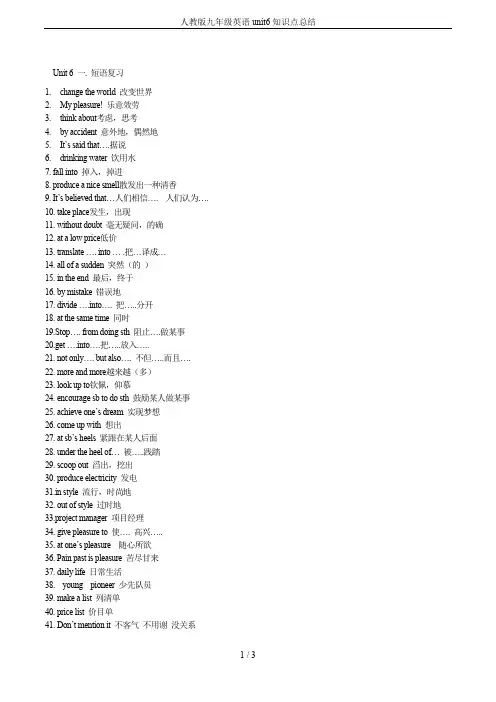
Unit 6 一. 短语复习1.change the world 改变世界2.My pleasure! 乐意效劳3.think about考虑,思考4.by accident 意外地,偶然地5.It’s said that….据说6.drinking water 饮用水7. fall into 掉入,掉进8. produce a nice smell散发出一种清香9. It’s believed that…人们相信…. 人们认为….10. take place发生,出现11. without doubt 毫无疑问,的确12. at a low price低价13. translate …. into … .把…译成…14. all of a sudden 突然(的)15. in the end 最后,终于16. by mistake 错误地17. divide ….into…. 把…..分开18. at the same time 同时19.Stop…. from doing sth 阻止….做某事20.get ….into….把…..放入…..21. not only…. but also…. 不但…..而且….22. more and more越来越(多)23. look up to钦佩,仰慕24. encourage sb to do sth 鼓励某人做某事25. achieve one’s dream 实现梦想26. come up with 想出27. at sb’s heels 紧跟在某人后面28. under the heel of… 被…..践踏29. scoop out 舀出,挖出30. produce electricity 发电31.in style 流行,时尚地32. out of style 过时地33.project manager 项目经理34. give pleasure to 使…. 高兴…..35. at one’s pleasure 随心所欲36. Pain past is pleasure 苦尽甘来37. daily life 日常生活38. young pioneer 少先队员39. make a list 列清单40. price list 价目单41. Don’t mention it 不客气不用谢没关系42.boil up 煮沸烧开43.remain calm 保持冷静44. sense of smell 嗅觉45. in doubt 可疑的不能肯定的46. sudden death 猝死47. spread to other countries 传播到其他国家48. a Chinese ruler 一位中国统治者49. over an open fire 在一堆明火上50. make tea 沏茶51. the national drink 国民饮料52. the popularity of tea 茶叶的普及53. go out alone 单独外出54. work on the invention of the telephone = invent the telephone 发明电话55.attract customers 吸引顾客56. Don’t put all your eggs in one basket 不要孤注一掷57. folk hero 民间英雄58. a much-loved and active sport 一项深受喜爱和活跃的运动59.in history 在历史上60. work together 合作61. lead to 把… 带到…. 导致62. more than 多于超出63.the personal computer 私人电脑64. take an active part in 积极参加二。
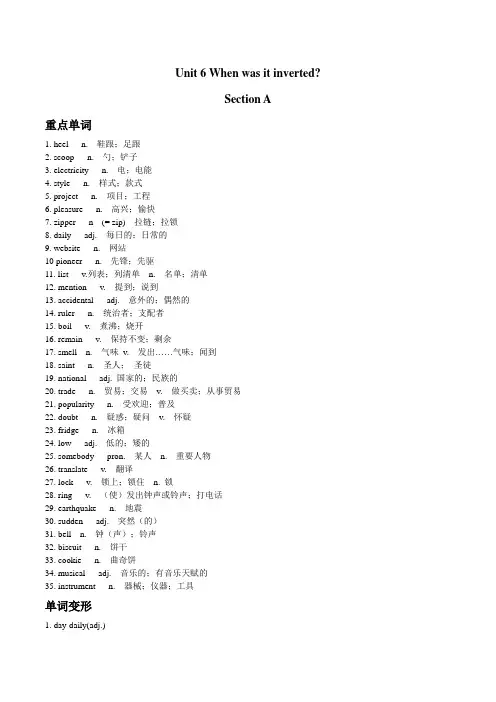
Unit 6 When was it inverted?Section A重点单词1. heel n. 鞋跟;足跟2. scoop n. 勺;铲子3. electricity n. 电;电能4. style n. 样式;款式5. project n. 项目;工程6. pleasure n. 高兴;愉快7. zipper n (= zip) 拉链;拉锁8. daily adj. 每日的;日常的9. website n. 网站10 pioneer n. 先锋;先驱11. list v.列表;列清单n. 名单;清单12. mention v. 提到;说到13. accidental adj. 意外的;偶然的14. ruler n. 统治者;支配者15. boil v. 煮沸;烧开16. remain v. 保持不变;剩余17. smell n. 气味v. 发出……气味;闻到18. saint n. 圣人;圣徒19. national adj. 国家的;民族的20. trade n. 贸易;交易v. 做买卖;从事贸易21. popularity n. 受欢迎;普及22. doubt n. 疑惑;疑问v. 怀疑23. fridge n. 冰箱24. low adj. 低的;矮的25. somebody pron. 某人n. 重要人物26. translate v. 翻译27. lock v. 锁上;锁住n. 锁28. ring v. (使)发出钟声或铃声;打电话29. earthquake n. 地震30. sudden adj. 突然(的)31. bell n. 钟(声);铃声32. biscuit n. 饼干33. cookie n. 曲奇饼34. musical adj. 音乐的;有音乐天赋的35. instrument n. 器械;仪器;工具单词变形1. day-daily(adj.)2. please-pleasure(n.)3. invent-invention (n.发明物) –inventor(n. 发明家)4. music-musical (adj.)5. translate-translation (n. 翻译)-translator重点短语1. be invented (by sb.) 被(某人)发明2. the style of… ……的样式3. seem to do sth. / seem that… 似乎……4. by accident 偶然;意外地5. have a point 有道理6. fall / drop into 掉……里,落入,陷入7. the saint of tea 茶圣8. be brought to sp. 被带到某地9. take place 发生;出现10. without doubt 毫无疑问;的确11. at a low price 以很低的价格12. advise sb. to do sth. 建议某人做某事13. translate… into… 把……翻译成……14. all of a sudden 突然;猛地15. be similar to…和……相似重点句型1.“电话是什么时候被发明的”“我想它是在1876年被发明的。
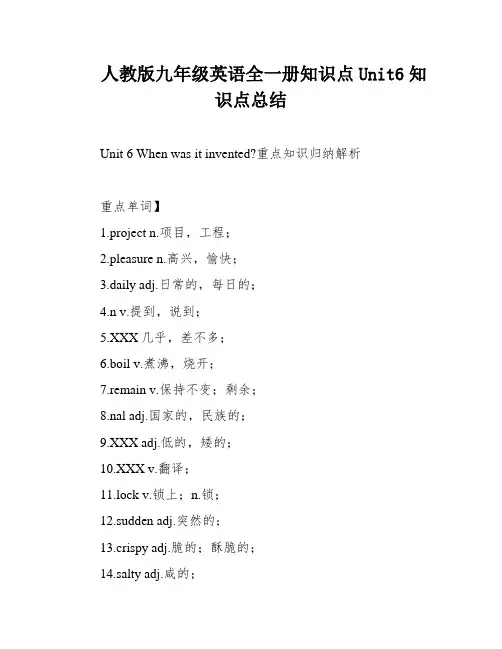
人教版九年级英语全一册知识点Unit6知识点总结Unit 6 When was it invented?重点知识归纳解析重点单词】1.project n.项目,工程;2.pleasure n.高兴,愉快;3.daily adj.日常的,每日的;4.n v.提到,说到;5.XXX几乎,差不多;6.boil v.煮沸,烧开;7.remain v.保持不变;剩余;8.nal adj.国家的,民族的;9.XXX adj.低的,矮的;10.XXX v.翻译;11.lock v.锁上;n.锁;12.sudden adj.突然的;13.crispy adj.脆的;酥脆的;14.salty adj.咸的;15.sour adj.酸的,有酸味的;16.customer n.顾客;17.Canadian adj.加拿大的;18.divide v.分开,分散;19.heron n.英雄,男主角;20.nal adj.职业的,专业的;重点词组】1.shoes with special heels 特殊后跟的鞋子2.hot ice cream scoop 热的冰其淋勺子3.run on electricity 电动的4.be used for 被用作5.the subject for my school project 学校项目的课题6.our daily lives 我们的日常生活7.have a point 有点道理8.XXX 偶然,意外地9.over the open fire 在火堆上10.fall into the water 落入水中11.take place 发生12.without doubt 毫无疑问13.at a low price 以一个很低的价格14.XXX the book into different languages 把书翻译成不同种的语言15.all of a sudden 突然16.by XXX 错误地17.a much-loved and active sport 一个深受喜爱并且积极的运动18.divide…into 把…分开19.sb from doing sth 阻止某人做某事20.look up to 钦佩,仰慕21.XXX XXX22.Borrowing someone else's idea1.In my n。
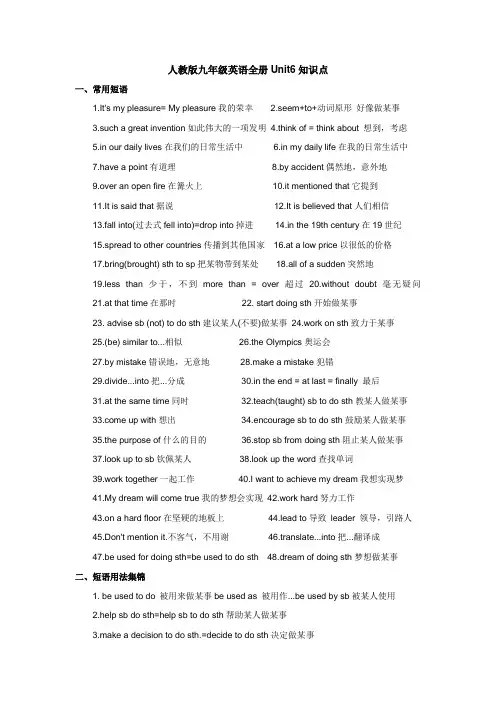
人教版九年级英语全册Unit6知识点一、常用短语1.It's my pleasure= My pleasure我的荣幸2.seem+to+动词原形好像做某事3.such a great invention如此伟大的一项发明4.think of = think about 想到,考虑5.in our daily lives在我们的日常生活中6.in my daily life在我的日常生活中7.have a point有道理8.by accident偶然地,意外地9.over an open fire在篝火上10.it mentioned that它提到11.It is said that据说12.It is believed that人们相信13.fall into(过去式fell into)=drop into掉进14.in the 19th century在19世纪15.spread to other countries传播到其他国家16.at a low price以很低的价格17.bring(brought) sth to sp把某物带到某处18.all of a sudden突然地19.less than少于,不到more than = over 超过20.without doubt毫无疑问21.at that time在那时22. start doing sth开始做某事23. advise sb (not) to do sth建议某人(不要)做某事24.work on sth致力于某事25.(be) similar to...相似26.the Olympics奥运会27.by mistake错误地,无意地28.make a mistake犯错29.divide...into把...分成30.in the end = at last = finally 最后31.at the same time同时32.teach(taught) sb to do sth教某人做某事e up with想出34.encourage sb to do sth鼓励某人做某事35.the purpose of什么的目的36.stop sb from doing sth阻止某人做某事37.look up to sb钦佩某人38.look up the word查找单词39.work together一起工作40.I want to achieve my dream我想实现梦41.My dream will come true我的梦想会实现42.work hard努力工作43.on a hard floor在坚硬的地板上44.lead to导致leader 领导,引路人45.Don't mention it.不客气,不用谢46.translate...into把...翻译成47.be used for doing sth=be used to do sth 48.dream of doing sth梦想做某事二、短语用法集锦1. be used to do 被用来做某事be used as 被用作...be used by sb被某人使用2.help sb do sth=help sb to do sth帮助某人做某事3.make a decision to do sth.=decide to do sth决定做某事4.make sb + adj使某人怎么样make sb do sth使某人做某事be made to do sth被使唤去做某5..in this way这样,用这种方式三、重点语法1.some time 一段时间sometimes 有时some times几次sometime 某个时候2.one of the world's favorite drinks世界最受欢迎的饮料之一.one of 什么之一,后面的名词用复数(一般要加S),动词用单数(一般要加S);favorite,最喜欢的,前面要用“谁的”.3.thousand千hundred百million百万,当它们前面有数字的时候,它们本身不能加S,当它们后面有of的时候它们要加S,但前面的数字和后面的of不能同时存在4.not…until直到…才,I don‘t go to sleep until 11 every day.我每天直到11点才睡觉。
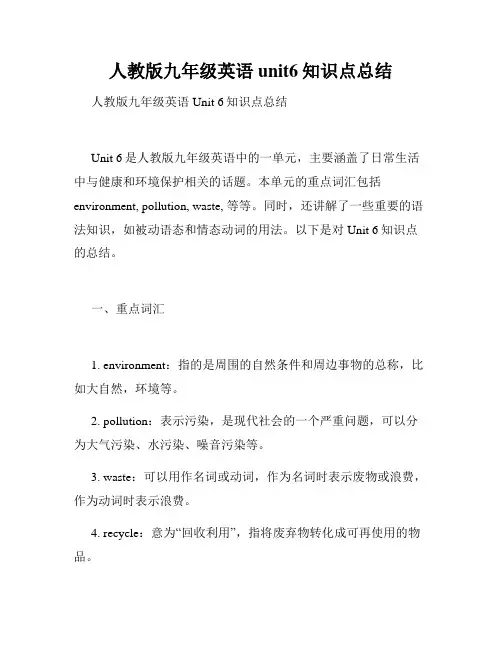
人教版九年级英语unit6知识点总结人教版九年级英语Unit 6知识点总结Unit 6是人教版九年级英语中的一单元,主要涵盖了日常生活中与健康和环境保护相关的话题。
本单元的重点词汇包括environment, pollution, waste, 等等。
同时,还讲解了一些重要的语法知识,如被动语态和情态动词的用法。
以下是对Unit 6知识点的总结。
一、重点词汇1. environment:指的是周围的自然条件和周边事物的总称,比如大自然,环境等。
2. pollution:表示污染,是现代社会的一个严重问题,可以分为大气污染、水污染、噪音污染等。
3. waste:可以用作名词或动词,作为名词时表示废物或浪费,作为动词时表示浪费。
4. recycle:意为“回收利用”,指将废弃物转化成可再使用的物品。
5. protect:表示保护,指采取措施,预防破坏或危害。
6. global:意为“全球的”,用来描述事情或现象具有全球性的范围和影响。
7. vehicle:表示车辆,可用来指代各种交通工具,如汽车、火车等。
二、重要句型和语法知识1. 被动语态(Passive Voice)被动语态是英语中重要的语法结构之一,使用形式为“助动词be + 及物动词的过去分词”。
例如:- The book was written by him.(这本书是他写的。
)被动语态常用于以下情况:- 强调动作的接受者(宾语)而不是执行动作的人(主语)。
- 主语未知或不重要。
- 特定情境下。
2. 情态动词(Modal Verbs)情态动词用来表示情态、可能性、建议、允许等。
常见的情态动词有can, could, may, might, should, must, ought to等。
例如:- You should recycle the plastic bottles.(你应该回收塑料瓶。
)3. 祈使句(Imperatives)祈使句是用来发出命令、请求、建议等的句子。
人教版九年级英语unit6知识点Unit 6一.短语复1.change the world改变世界2.My pleasure!乐意效劳3.think about考虑,思考4.XXX意外地,偶然地5.It’s said that….据说6.drinking water饮用水7.fall into掉入,掉进8.produce a nice smell散发出一种清香9.It’XXX…人们相信….人们认为….10.take place发生,出现11.without doubt毫无疑问,的确12.at a low price低价13.translate …。
into …。
把…译成…14.all of a XXX突然(的)15.in the end末了,终于16.by mistake毛病地17.divide ….into….把…。
分开18.at the same time同时…。
from doing sth阻止….做某事20.get ….into….把…。
放入…。
21.not only…。
but also….不但…。
而且….22.more and more越来越(多)23.look up to钦佩,仰慕24.XXX鼓励某人做某事25.XXX one’s dream实现梦想e up with想出27.at sb’s XXX紧跟在某人后面28.under the heel of…被…。
辚轹29.scoop out舀出,挖出30.produce electricity发电31.in style流行,时尚地32.out of style过时地33.project manager项目经理34.give pleasure to使….高兴…。
35.at one’s pleasure为所欲为36.Pain past is XXX苦尽甘来XXX日常生活38.XXX少先队员39.make a list列清单40.price list价目单41.Don’t XXX it不客气不用谢没关系42.boil up煮沸烧开43.remain calm保持冷静44.sense of smell嗅觉XXX可疑的不克不及肯定的46.XXX猝死47.XXX流传到其他国度48.a XXX一名中国统治者49.over an open fire在一堆明火上50.make tea泡茶51.the nal drink国民饮料52.the popularity of tea茶叶的普及53.go out alone单独外出54.work on the XXX吸引顾客56.Don’t put all your eggs in one XXX不要孤注一掷57.folk hero民间英雄58.a much-loved and active sport一项深受喜爱和活跃的运动59.in history在历史上60.XXX合作61.lead to把…带到….招致62.more than多于超出63.the personal computer私人电脑64.take an active part in积极参加二。
人教版九年级全一册英语Unit6单元语法知识点总结本单元重点短语的具体用法1. It's my pleasure.= My pleasure.:这两个短语都可以用来回答别人的感谢,表示“不用谢”或“不客气”。
例如:- Thank you for your help. - It's my pleasure./ My pleasure.2. seem + to + 动词原形:这个短语用于表示“似乎”“好像”做某事。
例如:- She seems to be happy.(她似乎很快乐。
)- The boy seems to like music.(这个男孩好像喜欢音乐。
)3. such a great invention:这个短语用于描述某项非常伟大的发明。
例如:- The computer is such a great invention.(电脑是一项如此伟大的发明。
)- The printing press was a great invention that changed the world.(印刷机是一项改变世界的伟大发明。
)4. think of = think about:这两个短语都有“考虑”“想到”的意思。
例如:- I'm thinking of buying a new car.(我正在考虑买一辆新车。
)- He always thinks about others.(他总是为别人着想。
)5. in our daily lives/ in my daily life:这两个短语用于描述在日常生活中的情况或活动。
例如:- Technology plays an important role in our daily lives.(科技在我们的日常生活中起着重要的作用。
)- In my daily life, I like to read books and exercise.(在我的日常生活中,我喜欢读书和锻炼。
精品基础教育教学资料,仅供参考,需要可下载使用!Unit 6 When was it invented?第1课时Section A(1a2d)style n. 样式;款式pleasure n. 高兴;愉快。
常用短语:with pleasure 乐意效劳daily adj. 每日的;日常的。
与everyday同义。
daily还可作副词,意为“每日;每天”,相当于every daymention v. 提到;说到。
口语中说“Don't mention it.”主要用来回答感谢,有时也用来回答道歉【拓展】(1)It's a pleasure./My pleasure.意为“不客气/不用谢。
”如:—Thank you very much.非常感谢你。
—It's a pleasure.不用谢。
(2)与daily类似的词还有:weekly adj. 每周的;adv. 一周一次地。
monthly adj. 每月的;adv. 一月一次地。
yearly adj. 每年的;adv. 一年一次地。
be used for被用于……。
介词for表示用途,后接名词、代词或动词ing形式have a point 有道理(1)be used by 被……使用。
介词by后面接动作的执行者。
如:English is used by travelers all over the world. 全世界的旅行者都使用英语。
(2)be used as 被当作……使用。
介词as表示“作为”,后面常接名词。
如:English is used as the second language in many countries. 英语在许多国家被当作第二语言使用。
(3)be used to do 被用来做……。
强调动作,其中used是动词use的过去分词。
如:This mac hine is used to clean the floor. 这个机器是用来扫地的。
Unit6 When was it invented?重点句子分析1.Is it really such a great invention?它真的是一项如此伟大的发明吗?such意为“如此”,用于修饰名词,既可接可数名词也可接不可数名词。
易混辨析:such和soso主要用以修饰形容词或副词,即so+adj./adv.His speech is so successful that many poeple regard him as a hero.such主要用以修饰名词,即such(a/an)+adj.+名词(如果该形容词时many/much/few/little等时,则需要把such换成so)I’m surprised to find he bought such a good cheap shirt.例:The boy is______clever______he can work out the problem easily.A.so...thatB.such...thatC.so...ifD.such...if2.Some leaves from a tea plant fell into the water and remained there for some time.一颗茶树的一些叶子落到水中并在那里停留了一段时间。
(1)本句中remainahi实意动词,意为“逗留,不离去”She left, but I remained behind.归纳拓展remain还可作连系动词,其后跟形容词、名词、分词等,意为“仍然是,保持(某种状态)”He remained standing by the window when we came out.Their working conditions remain poor.他们的工作条件仍旧很差。
(2)some time意为“一段时间”It will take us some time to go there on foot.易混辨析sometime,some times与sometimessometime意为“某时”,指不确定的时间He may come here sometime next week. some times意为“几次,几倍”I have been to Beijing some times.sometimes意为“有时”,是频度副词,表示频率He sometimes comes here to visit us. 例:My uncle will come_______next month and he will stay here for_____.A.sometime,some timeB.sometime,sometimeC.sometimes,some timeD.some time,some times3.It’s believed that tea was brought to Korea and Japan during the 6th and 7th centuries.据信,茶在6、7世纪期间被带到了朝鲜和日本。
Unit 6 When was it invented?1.重点词汇:style, project, pleasure, website, pioneer, ruler, smell,doubt, fridge, earthquake, biscuit, cookie, instrument, customer, basket, hero...2. 短语归纳:1.It's my pleasure.= My pleasure. 我的荣幸2.seem+to+动词原形好像做某事3.such a great invention 如此伟大的一项发明4.think of = think about 想到,考虑5.in our daily lives 在我们的日常生活中6.in my daily life在我的日常生活中7.have a point 有道理8.by accident 偶然地,意外地9.over an open fire 在篝火上10.it mentioned that 它提到11.It is said that 据说12.It is believed that人们相信13.fall into(过去式fell into)=drop into掉进…14.in the 19th century 在19世纪15.spread to other countries 传播到其他国家16.at a low price 以很低的价格17.bring(brought) sth. to sp. 把某物带到某处18.all of a sudden 突然地3. 必背典句:1.-When was the zipper invented? 拉链是什么时候被发明的?-It was invented in 1893. 它是1893年被发明的。
2. -Who was it invented by? 它是被谁发明的?-It was invented by Whitcomb Judson. 它是由惠特科姆·朱德森发明的。
九年级Unit6重点知识一词形词块拓展①please v.使高兴,使满意;→pleasure n.高兴,愉快→pleased adj. 开心的,满足的;→pleasing adj. 令人高兴的,令人满意的②day n.一天,一日,白天→ daily adj. 每日的,日常的③accident n. 事故→accidental adj. 意外的,偶然的④rule v. 统治,支配;n. 规则→ ruler n.统治者;支配者⑤ smell v.发出....气味;闻到→ smelled/ smelt(过去式)→smelled/smelt (过去分词) n.气味⑥ popular adj. 受欢迎的→popularity n. 受欢迎,普及⑦translate v.翻译→ translation n. 翻译,译本→translator n.翻译员,翻译家translate...into....把....翻译成......⑧sudden adj. 突然的n.突然发生的事→ adv.突然,忽然suddenly⑨ music n.音乐,乐曲→musical adj.音乐的,有音乐天赋的→ musician n.音乐家live music 现场音乐play wonderful music 播放美妙的音乐musical notes 音符⑩ring v.(使) 发出钟声或铃声;打电话→rang (过去式)→rung(过去分词)⑪doubt n.疑惑,疑问v.怀疑→doubtful adj.不确定的,怀疑的without doubt 毫无疑问in doubt 怀疑⑫complete adj. 彻底地,完全地v.完成→ completely adv. 彻底地,完全地⑬ near (adj. & prep.)→nearly adv. 几乎二、重点短语Section Ashoes with special heels 带特殊后跟的鞋子shoes with lights 带灯的鞋子hot ice-cream scoop 热的冰激凌勺子run on electricity 靠电the style of the shoes 鞋的款式be used for 被用来做什么think of an invention 想一项发明with pleasure 很乐意in our daily lives 在我们的日常生活中It's my pleasure 不客气the pioneers of different inventions 不同发明的先驱have a point 有道理spread to other countries 传播到其他国家at that time 当时an accidental invention 一项偶然的发明by accident 偶然A Chinese ruler called Shen Nong 一个叫神农的中国统治者boil drinking water over an open fire 在户外的火上烧水discover tea as a drink 发现茶可以饮用remain there for some time 在那里待了一段时间fall into the water 掉进水里quite delicious 相当美味 a few 一些,几个a few thousands later 几千年以后the saint of tea 茶圣It is believed that......人们认为.... less than 少于national drink 全国性的饮料take place 出现,发生spread the popularity of tea 茶的普及even though 虽然,尽管the nature of the tea 茶之本质without doubt 毫无疑问during the 6th and 7th centuries 在6世纪与7世纪之间at a low price 以低价drop into the hot water 掉进热水stole my camera 偷走了我的相机advise us not to go out alone 建议我们不要单独出去translate.......into.... 把......翻译成..... break the rule 打破规则all of a sudden 突然through an instrument similar to a telephone 用一种类似电话的器械Section Bby mistake 无意中thin enough 足够薄make the customer happy 使客户高兴in the end最后become an event at the Olympics 它成了奥运会的一个比赛项目for a long time很长时间play inside on a hard floor 在室内坚硬的地板上玩儿be born 出生devide.....into.....把....分成..... at the same time 同时stop sb. from doing sth. 阻止某人做某事the number of..........的数量stop the competing team from getting the ball into their own basket阻止竞争对手把球投进他们自己的篮筐里dream of becoming famous players 梦想成为著名的篮球运动员look up to仰慕encourage sb.to do sth.鼓励某人做某事in the hallway在走廊里encourage young people to work hard to achieve their dreams.鼓励年轻人努力工作来实现他们的梦想the professional basketball groups 职业篮球队come up with 想出It's hard to do sth. 很难做某事三.知识点① We never know what will ________ in the future, and the thing we can do is to enjoy the present.② Great changes have ___________ in China in recent years. People are becoming richer and richer.① It is ________ that there will be a good harvest.②It’s________ to all that playing too much computer games is bad for our health.③It’s________ that the poor children in the countryside have gotten much help from the kind people, and they can go to school again.② I’ll go there ____________in August.③ I have been to Beijing ______________.四.重点句子①It is said that a Chinese ruler called Shen Nong was the first to discover tea as a drink.据说一位叫做神农的中国统治者最早发现了茶可以饮用。
Unit6 When was it invented?语法:1、被动语态(1). 被动语态表示句子的主语是谓语动词所表示的动作承受者。
(2). 被动语态基本结构:be+及物动词的过去分词(如果是不用物动词,其过去分词应带有相应的介词)(3). 被动语态中的be 是助动词,有人称、数和时态的变化。
一般现在时被动语态为:am/is/are+过去分词一般过去时被动语态为:was/were+ 过去分词与情态动词连用的被动语态:情态动词+ be + 过去分词(4). 被动语态中动作的发出者或执行者做介词by的宾语,放在句末,by 表示“由,被”的意思2、如何理解被动语态?为更清晰、更深刻地理解被动语态的含义,可以将主动语态和被动语态的句子结构进行比较。
主动语态:主语+ 谓语动词+ 宾语+ 其他成分被动语态:主语+ be +过去分词+ by +宾语+其他成分如:被动语态English is spoken by many people.课文知识要点:1、When was it invented?它是什么时候发明的?invent v. 发明→inventor n. 发明家→invention n. 发明可数名词invent v. “发明”指发明创造出自然界本来不存在的东西,如工具、方法、手段、汽车、电器、合成材料等。
Bell invented the telephone. 贝尔发明了电话。
Smith invented a new teaching method. 史密斯发明了一种新的教学方法。
Edison, a great inventor, invented over 1’000 inventions all his life.2、What is it used for?它是用来做什么的?be used for“用来做…”;此短语中的for是介词,表示用途,后接名词或动词-ing形式。
Pens are used for writing. 笔是用来写的。
Pens aren’t used for ea ting. 笔不是用来吃的。
比较:be used as、be used by、be used to do、be used to doing、used to do①be used as意为“被用作……”,介词as表示“作为”,其后一般接名词,强调使用的工具及手段。
English is used as the second language in many countries.英语在许多国家被当作第二语言使用。
This room is used as their office. 这人房间被用作他们的办公室。
②be used by意为“被……使用”,介词by后面接动作的执行者(宾语)。
English is used by travelers and business people all over the world.全世界的旅行者和商人们使用英语。
Tractors are used by the farmers. 农民使用拖拉机。
③be used to do意为“被用来做……”,用于被动语态。
Computers can be used to do many things.电脑可用来做许多事。
This knife is used to cut bread.④be/get used to doing意为“习惯做……”,My cousin is used to studying with his new friends in Australia.My mother is used to getting up early to cook breakfast for us.He got used to living in the country.⑤used to do意为“过去经常做……”。
I used to go swimming on Saturdays.3、the style of the shoes 鞋子的款式In style 时髦的out of style 过时的Her clothes are always in style.她的衣服总是很时髦。
4、With pleasure!非常愿意!pleasure n.“快乐、愉快、高兴”。
常用在口语中。
常用短语:With pleasure. My pleasure. It is a pleasure.It's a pleasure to read this book. 读这本书真是件乐事。
Thanks for helping me. With pleasure./ It's a pleasure.别客气。
与pleased、pleasant的区别:①pleased adj.“高兴的”。
(表示的是主观上“感到高兴或愉快的”,指的是被修饰名词自身的感觉。
)短语:be pleased to do sth.乐于做某事;be pleased with“对……满意”I'm very (much) pleased with his work. 我对他的工作非常满意The children were very pleased.孩子们很高兴。
②pleasant adj.“令人愉快的、舒畅的、非常好的、讨人喜欢的、风趣的”。
表示客观上的“令人高兴或愉快的”,指的是被修饰名词给别人的感觉。
主语一般为物。
pleasant 主要有两方面用法:一是用来说明事物,表示“令人愉快的”或“舒适的”等;二是用来说明人,表示“友好的”、“讨人喜欢的”等。
The weather was cold, but the trip was pleasant. 虽然天气很冷,但旅途还是很愉快。
It was a pleasant surprise to see her again. 再次见到她真是又惊又喜。
Make an effort to be pleasant at the party. 在晚会上要尽力友善待人(或尽量使人高兴)。
Wish you a pleasant journey!祝你旅途愉快!5、Think about how often it’s us ed in our daily lives.想想看它在我们的日常生活中是多么经常被用到。
daily adj.“日常的、每日的”。
Daily life 日常生活。
Daily adv.“每日、每天”Don’t you read the daily news in today’s newspaper?你没读今天报纸上的每日新闻吗?—How did you know the news about Greenpeace, Lisa?—Well, I got it from China Daily.Weekly 每周的monthly 每月的yearly 每年的6、Well,you do seem to have a point…嗯,看来你说的确实有道理……have a point“有道理”,固定短语。
You have a point—it would be better to wait till tomorrow.你说的有道理,还是等到明天比较好。
7、The pioneers of different inventions were listed there.各种发明的先驱者们被列到了上面。
①pioneer n.“先驱、先锋”China Young pioneers 中国少先队②list v.“列表、列清单”List them and you will never forget them.把他们列出来你就不会忘了。
list n.“名单、清单”I didn’t see his name on the list.我在名单上没有看到他的名字。
8、For example, it mentioned that the zipper was invented by Whitcomb Judson in 1893.例如,它提到拉链是在1893年由惠特科姆.贾德森发明的。
mention v.“提到、说的”①mention sth. /sb.(to sb.)(向某人)提起某事/某人D on’t mention it before the children.在孩子们面前不要提及此事。
Nobody mentioned anything to me about it.没人向我提过这事。
②mention doing sth. 提到做某事Whenever I mention having dinner together,he says he’s too busy.无论何时我一提起一块儿吃顿饭,他就说他很忙。
③mention + that从句“提到、说到”He mentioned that the food was invented by a Chinese.他提到这种食物是由一个中国人发明的。
④D on’t mention it.主要用来回答感谢或回答道歉。
“不客气”、“没关系”---Thank you very much.--- D on’t mention it.多谢了。
不客气。
---I’m sorry to trouble you.--- D on’t mention it.对不起,打扰你了。
没关系。
9、How tea was invented by accident?茶是如何被偶然发明的?by accident“偶然、意外地”He made this mistake by accident.他犯这个错误纯属偶然。
I knew his name by accident.我偶然知道了他的名字。
10、It is said that a Chinese ruler called Shen Nong was the first to discover tea as a drink.据说有一位叫神农的中国统治者最早发现了茶可以饮用。
①It is said that+从句“据说……”,it是形式主语,that引导的从句是真主语。
It is said that he is a rich second generation.据说他是一位富二代。
类似:It is believed that…“据认为……”It is known that…“众所周知……”It is reported that…“据报道……”It is supposed that…“据推测……”②ruler “统治者、支配者”“尺子”Her brother is the king, but she is the effective ruler.她兄弟为国王,但她却是真正的主宰者。